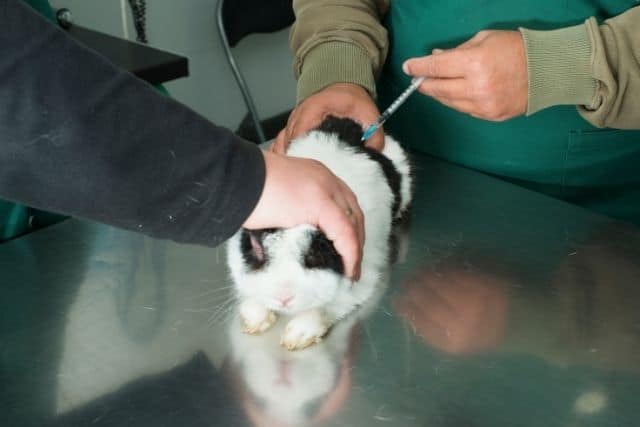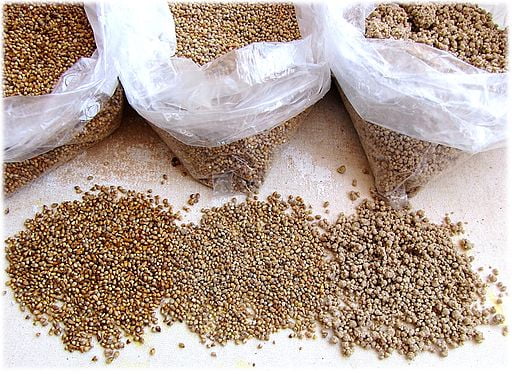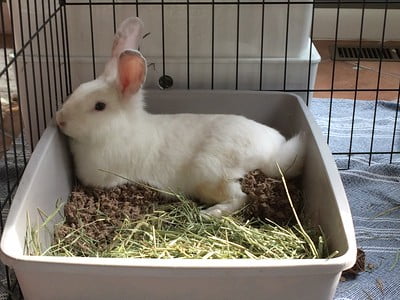Last Updated on March 1, 2023 by Marjon Ramos
When a rabbit has poop stuck to his bum or “poopy butt”, it’s either soft uneaten cecotropes that are getting stuck in your rabbit’s fur or diarrhea.
If it’s soft uneaten cecotropes, you should improve your rabbit’s diet by feeding a lot of fiber (hay). You should remove or reduce the amount of supplementary food (pellets and treats) in your rabbit’s diet.
If it’s diarrhea, bring your rabbit to a veterinarian immediately. Diarrhea in rabbits is an emergency, especially in young rabbits.
Now that I’ve given you the gist of the article, read on as I explain in more detail why your rabbit has poop stuck to its bum:
Table of Contents
What causes “poopy butt” in rabbits?

Poopy butt is the term used when a rabbit has poop stuck on its fur. While normal rabbit poop is not that smelly, when a rabbit has a poopy butt, the smell is quite stronger than regular rabbit poop.
This condition is probably the number one reason rabbits are abandoned and surrendered to animal shelters.
Poopy butt in rabbits is mostly caused by two things:
Soft uneaten cecotropes
Soft uneaten cecotropes mainly happen when a rabbit is fed the wrong kind of diet. Usually, rabbits that have soft uneaten cecotropes are fed diets that are high in carbs and low in fiber.
Diarrhea
You can tell the difference between diarrhea and soft uneaten cecotropes by looking if there are any solid poop pellets in your rabbit’s litter box.
Rabbits with soft uneaten cecotropes would still produce normal-looking poop pellets. While rabbits with diarrhea would produce soft or watery stool.
Causes of diarrhea in rabbits:
- High-carb, low-fiber diet
- Stress
- Bacterial infection
- Viral infection
- Parasite infection
- Sudden diet change
- Toxins(heavy metal poisoning, toxic plants, etc..)
- Improper drug use
What to do if your rabbit has a poopy bottom?

When your rabbit has a poopy butt, first you should determine whether it’s soft uneaten cecotropes or true diarrhea.
If it’s soft, uneaten cecotropes:
There are two things you need to do if your rabbit is suffering from soft uneaten cecotropes:
Only feed your rabbit hay.
Remove any other food from your rabbit’s diet except hay. This would ensure that your rabbit is getting enough fiber in its diet. Sometimes rabbits eat too much supplementary food like pellets and veggies in lieu of hay.
After a couple of weeks of only feeding hay, your rabbit’s cecotropes should return to normal.
Then you can start to:
Slowly introduce veggies to your rabbit one at a time and remove those that are causing soft uneaten cecotropes.
After some time of only feeding your rabbit hay, your rabbit’s poop should go back to normal.
You can now start to slowly re-introduce veggies to your rabbit one at a time. Make sure that you only give your rabbit veggies that are on the safe list.
If you find that certain vegetables are causing your rabbit to have softer cecotropes, either lower the amount you give or remove them entirely. I prefer the latter.
If its diarrhea
Diarrhea in rabbits is extremely dangerous, especially for young rabbits. The first thing every rabbit owner should do when their rabbit is suffering from diarrhea is:
Bring your rabbit to a veterinarian.
You should consider it an emergency when your rabbit has diarrhea. Rabbits with diarrhea can quickly die due to dehydration if not treated immediately.
Immediately bring your rabbit to a veterinarian if you notice any changes in your rabbit’s stool.
Improve your rabbit’s diet.
After getting cleared by a veterinarian, you should start changing your rabbit’s diet if that’s what’s causing the diarrhea.
Feed a lot of high-quality hay to your rabbit. Reduce the amount of pellets and be on the lookout if a certain vegetable is causing diarrhea.
Improve your rabbits living condition.
Diarrhea can also be caused by stress due to your rabbit’s current living conditions.
Check if your rabbit is getting the following:
- Your rabbit should be getting at least 4 hours of exercise each day.
- Your rabbit should have toys to keep them stimulated and avoid boredom.
- Your rabbit should have a companion, preferably another rabbit.
- Your rabbit should have the right cage for its size and breed.
- Your rabbit should have access to food and water all the time.
Summary
The causes of a poopy bottom in rabbits are either soft uneaten cecotropes or diarrhea. If it’s diarrhea, bring your rabbit to a veterinarian and improve your rabbit’s diet and living conditions.
If it’s soft uneaten cecotropes, remove any other food except hay. This would ensure that your rabbit is getting enough fiber.
After some time, your rabbit’s poop should go back to normal. You can now start to re-introduce veggies to your rabbit’s diet slowly and one at a time.
This would give you an idea if a certain vegetable is causing your rabbit to have a softer stool.
Cite this article:
Related Articles
- Can Rabbits Eat Asparagus? 9 things you need to know.
- Can Rabbits Eat Tomatoes? What You Need To Know.
- Can Rabbits Eat Watermelon? What You Need To Know.
- Can Rabbits Eat Grapes? What You Need To Know.
- Can Rabbits Eat Broccoli? What You Need To Know.
- Can Rabbits Eat Apples? What You Need To Know.
- Can Rabbits Eat Cabbages? What You Need To Know.
- Can Rabbits Eat Strawberries? What You Need To Know.
- Can Rabbits Eat Bananas? What You Need To Know.
- Can Rabbits Eat Oranges? 9 things you need to know.
- Can Rabbits Eat Blueberries? Here’s Why.
- Can Rabbits Eat Spinach? Your Questions Answered.
- Can Rabbits Eat Cucumbers? Here’s Why.
- Can Rabbits Eat Celery? What you need to know.
- Can Rabbits Eat Radishes: Everything You Need To Know
Sources and further reading
- Buseth, Marit Emilie., and Richard A. Saunders. Rabbit Behaviour, Health, and Care. CABI, 2014.
- Lebas, F. The Rabbit: Husbandry, Health, and Production. Food and Agriculture Organization of the United Nations, 1997.
- Patry, Karen, et al. The Rabbit-Raising Problem Solver: Your Questions Answered about Housing, Feeding, Behavior, Health Care, Breeding, and Kindling. Storey Publishing, 2014.
- Understanding the Basics of Rabbit Care
- Basic-Rabbit-Care
- Health Problems in Rabbits




